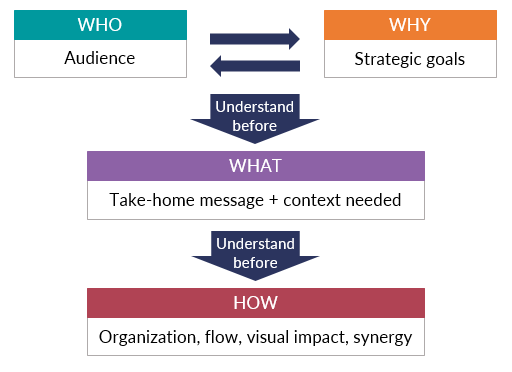About the Communication Lab
The Communication Lab is an educational program within the MIT School of Engineering. Our goal is to help engineering students and postdocs learn the technical and professional communication skills they need to achieve their career goals. We do this by training students and postdocs as Communication Fellows, who coach their peers within their departments. In addition to our core service of one-on-one, discipline-specific coaching, the Communication Fellows offer workshops, online articles, and other resources to help trainees build vital skills in written, oral, and visual communication.
In effect, we offer a two-tiered training service: by intensively training the Communication Fellows, we empower them to provide their communities with innovative, grassroots communication support.
Educational philosophy
The Communication Lab applies a “just in time” learning philosophy to its efforts. We align our services with students’ and postdocs’ authentic communication tasks and deadlines, and work to meet them where they are, literally and figuratively.
Our approach to communication emphasizes iteration among a set of strategic questions: communicators must define their audience (Who?) and goals (Why?) for their communication before selecting content (What?) and making choices about organization and presentation (How?).
 Fellow training model
Fellow training model
Our peer coaches are practicing engineers and scientists, first and foremost. We train them rigorously to offer their peers strategic consultations about how to improve their scientific and professional communication, including written, visual, and oral media.
We focus as much on the Fellow experience as we do our clients’. All first-year Fellows receive a year-long training program (eight workshops of two hours each) to build their skills in coaching and communication. Our trainings employ an “80/20” balance of content: 80% of the content is shared (theory and strategy), but 20% is customized for each department (field-specific conventions and examples). All Fellows are mentored by staff managers and experienced Fellows, and are invited to attend professional development opportunities that we host for them throughout the year.
History and growth
The Communication Lab was first piloted in 2013 in the Department of Biological Engineering (BE) under the faculty leadership of Professor Eric Alm and Department Head Doug Lauffenburger. BE wanted to provide additional support for its students to learn communication skills, and hired Jaime Goldstein to launch a model centered on discipline-specific peer coaching.
Following its success in BE, the Comm Lab model has been adapted by other MIT engineering departments and other academic institutions:
- 2014: Nuclear Science and Engineering
- 2015: Electrical Engineering and Computer Science
- 2016: Broad Institute of MIT and Harvard (sister program)
- 2017: Chemical Engineering
- 2018: Mechanical Engineering
- 2020: Civil and Environmental Engineering
- 2022: Aeronautics and Astronautics
Since 2016, the Communication Lab has been a School of Engineering program within the Gorden Engineering Leadership ecosystem, under the oversight of GEL co-directors Dr. Reza Rahaman, Professor Douglas Hart, and Professor Martha Gray.
Since 2017, the Communication Lab model has also been taught to and adopted by institutions beyond MIT via the Summer Institute training workshop. This has resulted in the formation of the greater Communication Lab Consortium; read more about the Communication Lab Consortium here.
Organizational structure
To provide discipline-specific service, the MIT Communication Lab operates through a membership model. Each member department has its own Communication Lab Manager, who customizes the program’s services and outreach to match the needs, culture, and goals of their community. Cross-departmental leadership is provided by the central Program Director. See our current staff here.
